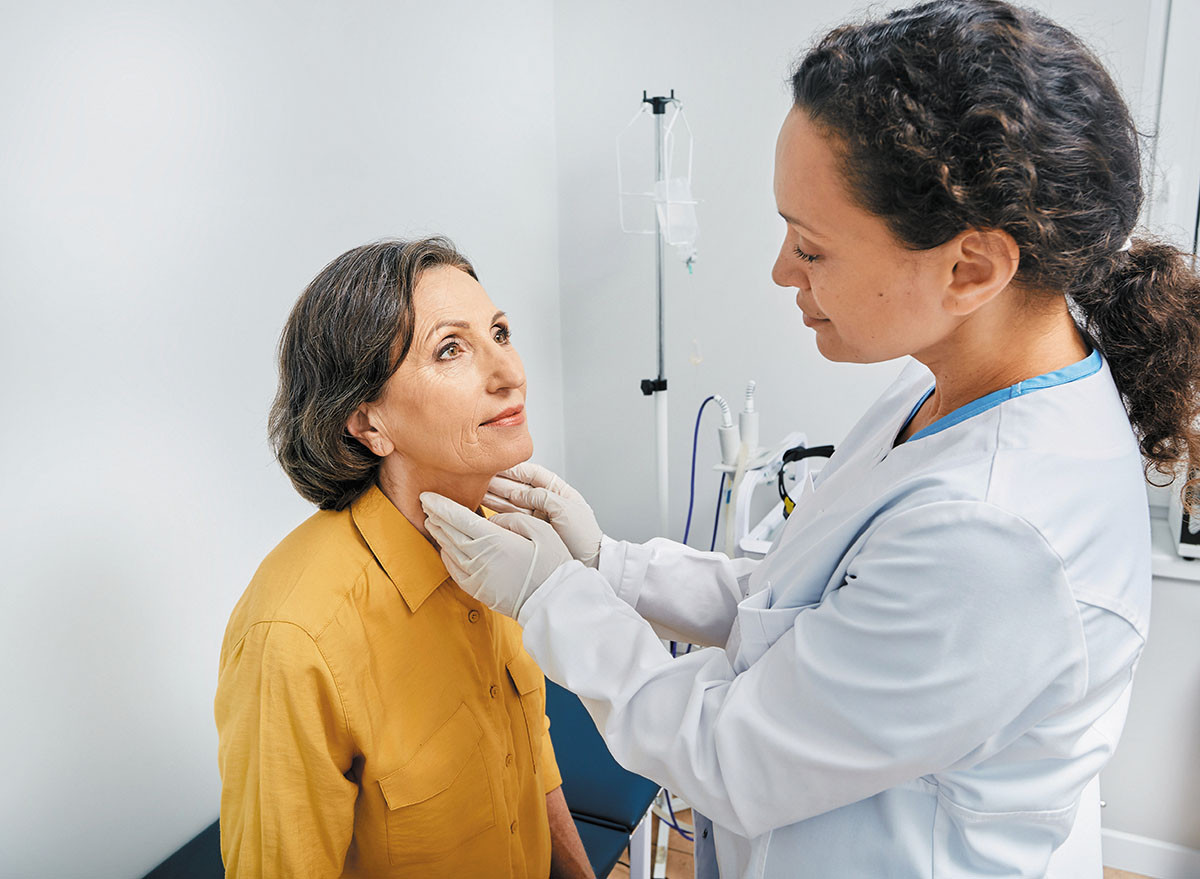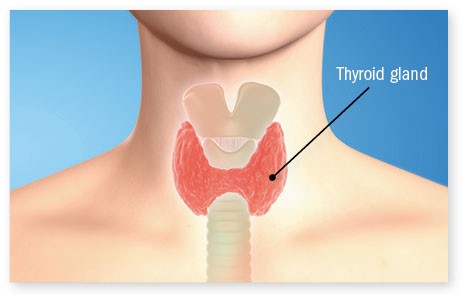Got a goiter?
Thyroid enlargement or nodules are extremely common, but what might they mean?
- Reviewed by Toni Golen, MD, Editor in Chief, Harvard Women's Health Watch; Editorial Advisory Board Member, Harvard Health Publishing; Contributor

It's so routine, you almost don't notice it: the light pat-down of your neck your doctor performs during a check-up. Among other conditions, she's checking for a goiter — an enlarged thyroid — or nodules within the butterfly-shaped gland that might signal a spectrum of health issues or prove completely harmless.
Thyroid nodules are quite common, affecting nearly half of all people by age 60, says Dr. Sara Ahmadi, an endocrinologist specializing in thyroid diseases at Harvard-affiliated Brigham and Women's Hospital. Women are affected four times as often as men, according to the American Academy of Family Physicians.
While your doctor's neck exam seems simple, the thyroid's role in our overall well-being is anything but. From its perch just below the voice box, the gland produces hormones important to energy level, temperature, metabolism, and hair and nail growth.
A nuanced array of tests are necessary to determine if thyroid function has gone awry, since a goiter or growth doesn't necessarily mean the gland is making too much or too little hormone. Less commonly, a goiter or nodule can indicate cancer. But even a benign goiter or nodule can grow large enough to interfere with breathing, swallowing, or speaking.
"If you have trouble swallowing or lying flat because you feel like you're being choked, you should be evaluated," Dr. Ahmadi says. "If you're hoarse almost every day, that would also be worrisome."
|
The thyroid gland produces hormones important to the way our bodies work. Image: © Lars Neumann/Adobe Stock |
Ruling out cancer
Routine blood tests can check thyroid hormone levels but can't always detect a malignancy. "Many patients with thyroid cancer have a normal blood test," Dr. Ahmadi notes. But ultrasound imaging to screen for thyroid cancer isn't recommended for people with a gland that feels normal during an exam unless you have a specific risk factor for thyroid cancer, including a strong family history or past radiation exposure to your head or neck.
"When you see your primary care doctor or gynecologist, make sure they examine your thyroid gland and neck," she says. "Most do it automatically, but not all of them. If they find something concerning during the exam, your doctor will usually order a blood test to check the gland's function and an ultrasound."
The ultrasound technician conducting the test will measure the thyroid's size and highlight any nodules lurking within. Small nodules in people with otherwise-normal thyroid function may simply need to be monitored.
Larger nodules can be biopsied to determine if they are benign or cancerous. In the majority of cases, it's not cancer. "Between 80% and 90% of thyroid nodules are benign," Dr. Ahmadi says. If cancer is found, however, or if a benign growth is causing severe symptoms, surgery can remove all or part of the gland.
New treatment adds to list
Doctors may soon have a new approach to consider for treatment of thyroid nodules. But deciding which, if any, treatment is warranted depends on several factors. These include the size of the abnormality and its underlying causes, as well as symptoms.
A new therapy called radiofrequency ablation was hailed as "ready for prime time" in an October 2022 commentary published in the journal RadioGraphics. Available in Europe and Korea for many years, this outpatient technique has been practiced in the United States for thyroid nodules for only the last few. It involves using heat from an electrically charged needle to destroy (ablate) nodule tissue. After the procedure, the nodule typically shrinks over time.
"One of the challenges is insurance coverage," Dr. Ahmadi notes. "Even though the technique is not experimental, not all insurers have yet agreed to cover it."
Image: © Peakstock/Getty Images
About the Author

Maureen Salamon, Executive Editor, Harvard Women's Health Watch
About the Reviewer

Toni Golen, MD, Editor in Chief, Harvard Women's Health Watch; Editorial Advisory Board Member, Harvard Health Publishing; Contributor
Disclaimer:
As a service to our readers, Harvard Health Publishing provides access to our library of archived content. Please note the date of last review or update on all articles.
No content on this site, regardless of date, should ever be used as a substitute for direct medical advice from your doctor or other qualified clinician.

















